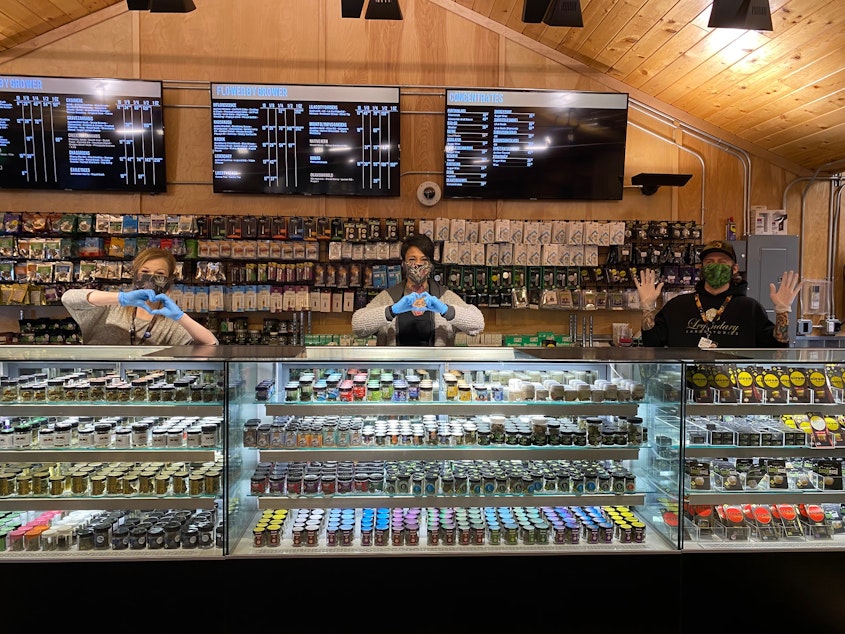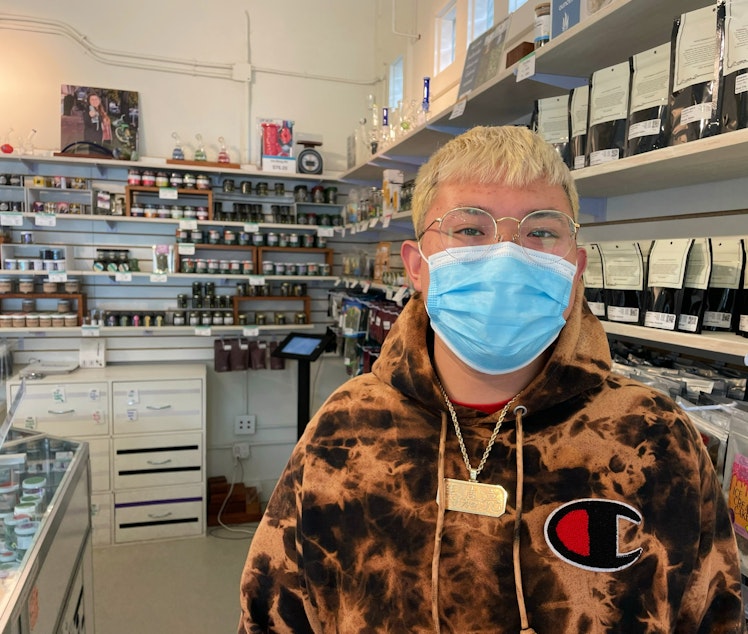Pot tax proposal on Seattle City Council's radar: Leaked document

Jeremy Mar works behind a glass counter lined with rows and rows of weed products.
There are sticky clusters of pungent greens, and vibrantly-colored packages bearing names like “orange cream cookies.” Part of his job here at Hashtag Cannabis, a recreational retail shop near the Fremont Bridge in Seattle, is to help customers navigate the vast selection of pot.
Mar points to a new pesticide-free strain of “flower” from a grower called Heavenly Buds.
“It is pretty spacey in the head. Not the most clear-headed or productive strain, but it is really nice to unwind with,” he explained.
Mar, who is Chinese and Filipino-American, said he’s gaining valuable skills that'll help him advance in the cannabis industry.
But critics of the pot business say, in the bigger picture, communities of color are not benefiting enough from booming sales. Last year the pot industry generated over $1.4 billion in Washington state, according to the Washington Cannabusiness Association.

At the root of this concern is the legacy of the “War on Drugs,” a policy launched by President Richard Nixon in 1971 to crack down on illegal drug use. The policy has had some lasting negative consequences, particularly for communities of color. Black and Latino people make up almost two-thirds of Americans in state prisons for drug offenses, for example, according to the Drug Policy Alliance, a nonprofit that supports decriminalizing drugs. These policies have also had lasting economic consequences. A drug arrest can make it harder to get an education, land a job or buy a home and, ultimately, build generational wealth.
Sponsored
Seattle's City Council is holding hearings on the issue, and looking at what it might do to help address some of those wrongs.
One possibility: A new tax on cannabis sales.
KUOW has obtained a PowerPoint presentation that details how such a tax might work. The document has been circulating among council members behind closed doors. See that document at the bottom of this article.
Advocates argue the tax and other proposals would help address racial inequities in the pot industry. Pot business owners counter that the industry is already heavily taxed, and they question how the Council would spend any new tax money.
The City Council has not yet formally introduced any new cannabis equity legislation. For now, it's just mulling over a proposal drafted in January by the United Food and Commercial Workers Local 21 (UFCW21).
Sponsored
The union is advocating for, among other measures, a sales tax, which includes adding 25 cents per gram of flower and $2.00 per half-gram of concentrates like hash oil. The union estimates its tax proposal could generate around $5 million a year. So far, it’s not entirely clear how that money would be spent, if new tax legislation comes to pass.
Councilmember Teresa Mosqueda, who heads the committee that's considering the proposal, told KUOW she's weighing multiple approaches to equity in the pot industry.
"[I] am working to compare strategies before any policy is drafted," she said.
Dustin Lambro, who is working on the issue for UFCW21, said the union wants to see some of the potential tax revenue go to “training programs,” designed in part to help people of color make it in the industry. He said, for example, that budtenders could take classes to learn about pot strains or retail safety. Those offerings would be similar to apprenticeship programs that industries like construction already offer.
“That model has proved over time to be a real win-win for both workers and employers,” Lambro said of apprenticeships.
Lambro added that his union could be involved in new cannabis industry training programs. The union currently trains workers in the grocery industry.
Sponsored
Lambro also said other cities, such as San Francisco, could be a model for Seattle's future policies around equity in cannabis retail. San Francisco has a cannabis apprenticeship program on the books, but so far it hasn't been implemented. UFCW has also been trying to unionize the cannabis industry in San Francisco.
Some Seattle business owners and their advocates are skeptical of the new tax proposal.
“You're making the product more expensive for things that we see are also kind of misguided, in terms of trying to achieve equity,” said Adan Espin, executive director of the Craft Cannabis Coalition, a pot industry trade group. His organization opposes funneling new pot tax money into a union-backed training program.
Espino points out that pot sale taxes in Washington state are already the highest in the entire country. Nearly half of every dollar that customers spend in cannabis retail shops goes toward taxes.
Jerina Pillert, who co-owns the Hashtag Cannabis store, said she supports programs to reduce systemic racism in all industries. She added that many of her customers in Seattle may be willing to pay a new tax. But she, too, noted that the state already collects billions of dollars in tax revenue from the industry. She also questioned whether additional tax money would truly address inequities in Seattle.
Sponsored
“We see the City Council doing a lot of Band-Aid fixes on a lot of issues, instead of actually digging deep and working on the systemic changes that need to happen," Pillert said.
The union's proposal shows that at least some tax revenue could go toward an “equity fund” to help communities disproportionately affected by the war on drugs.
The Council is also looking at promoting efforts to hire more people from those communities to work in the cannabis industry. And it's considering ways to help pot business owners who are Black, Indigenous, and people of color.
Currently, the vast majority of pot businesses in Seattle are white-owned. The state of Washington plans to award nearly 40 new equity business licenses to people affected by the war on drugs. But, for now, just two of those retail licenses would go to new stores in Seattle.
CLARIFICATION 3/24: An earlier broadcast version of this story overstated the compensation of budtenders at Hashtag Cannabis as "up to $22 an hour, plus tips." Co-owner Jerina Pillert later clarified that most budtenders make up to $22 an hour after tips are factored in.
Seattle City Council Cannabis Policy PowerPoint
UFCW Cannabis Policy Outline PPT.pdf




